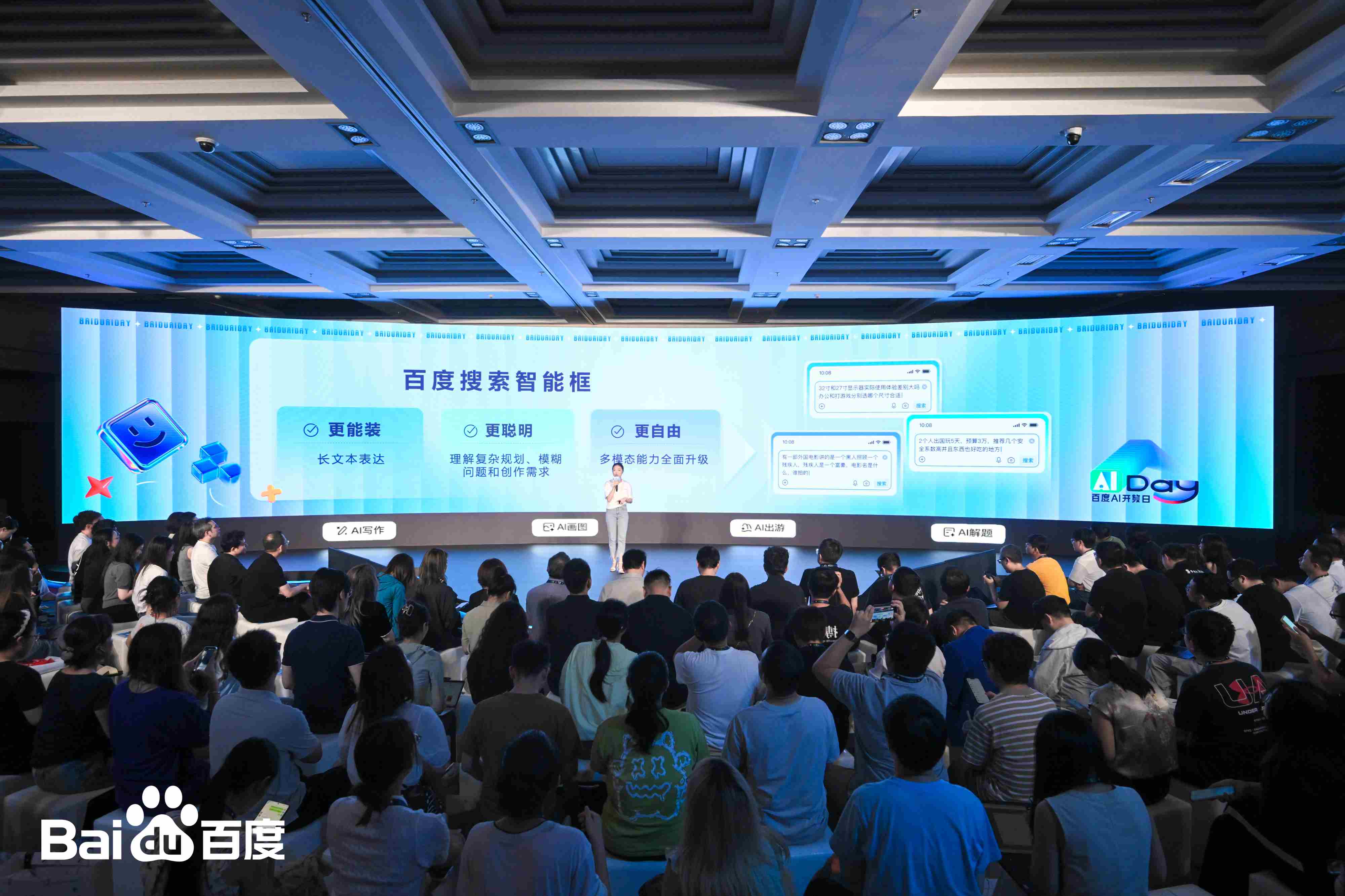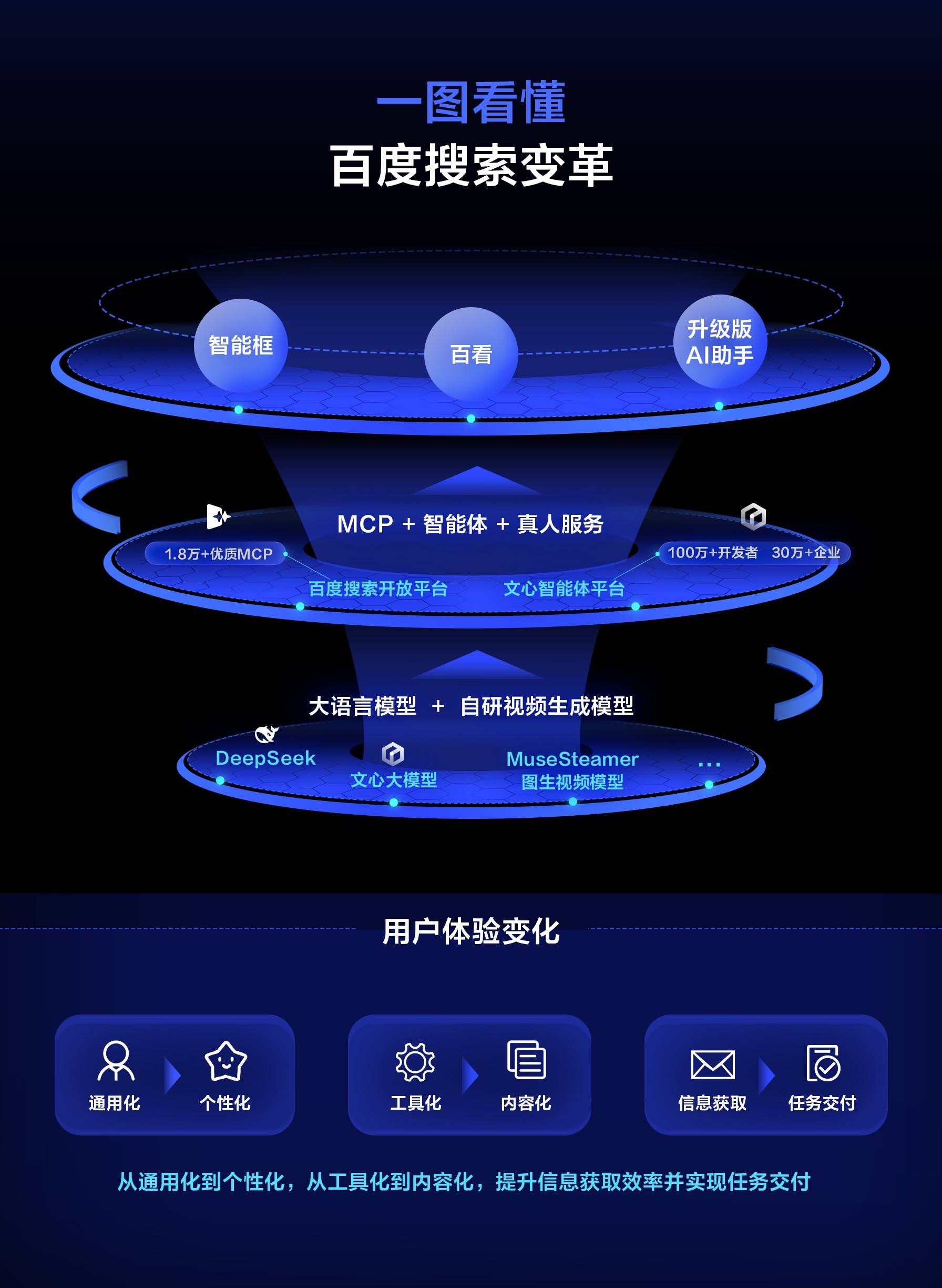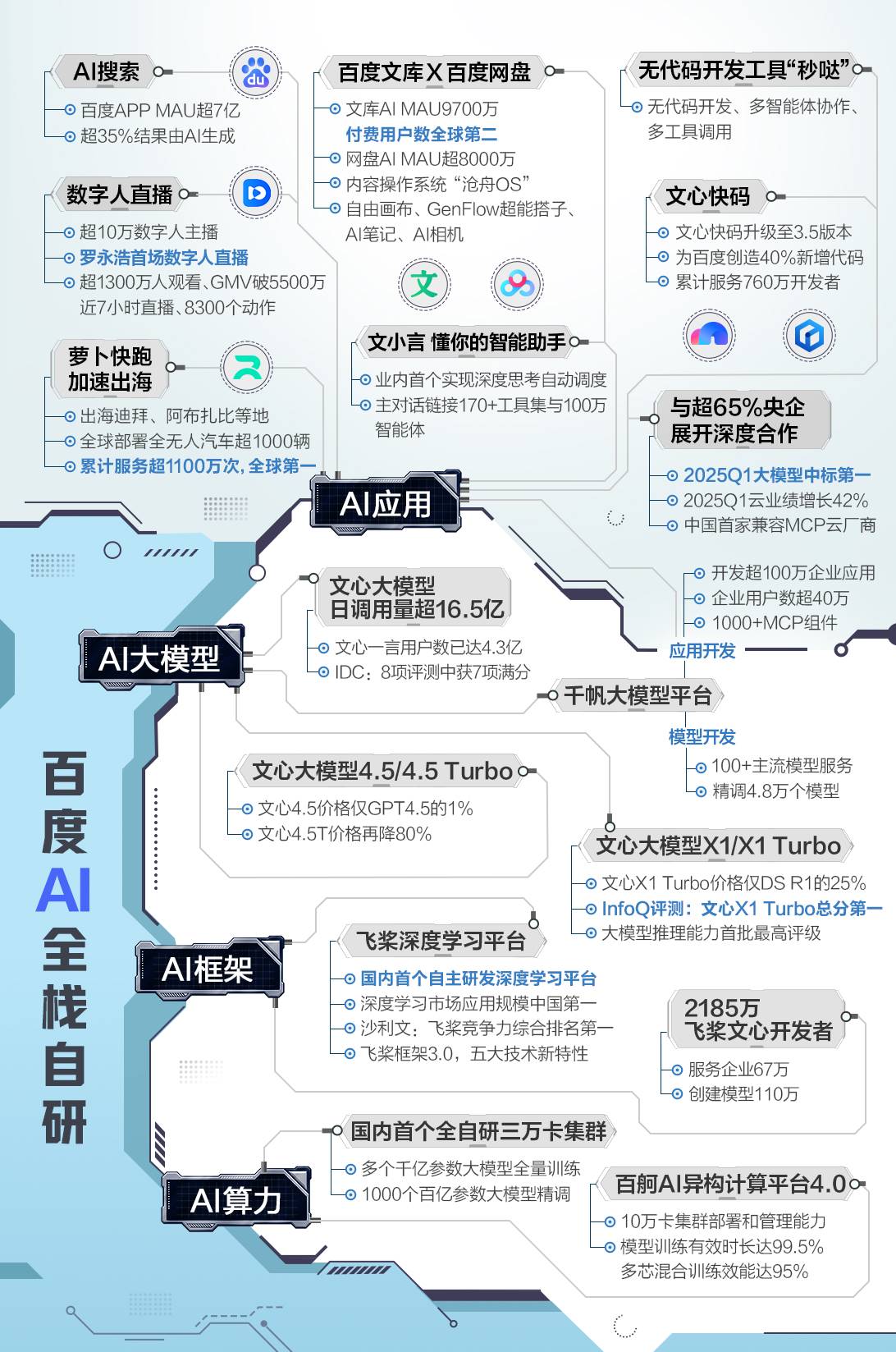The Ecological Entry of the AI Era is Still Search.
Author: Lian Ran

Header image source: Baidu
From Chatbot to Perplexity, search is being rewritten by AI, but this is just the beginning.
Chatbot and Perplexity.ai represent two exploratory paths for AI to reshape search: one is the conversational interaction path, and the other is the "answer is the result" path.
While they seem to have broken through the traditional search framework, both attempts still have their limitations—either lacking systematic capabilities or insufficient coverage and limited reasoning depth. Today, they cannot completely replace traditional search engines.
The true search products of the AI era may not have been fully defined yet, but the "reconstruction" of search is continuously moving forward.
For more than 20 years, search engines have been the core entry point of the internet. Its essence is to provide users with fast and extensive information retrieval based on keyword-centric logic. Now, with the continuous breakthroughs of large models, this system is undergoing ongoing changes.
Search is no longer just a combination of information lists; it has transformed into an "intelligent assistant" that understands needs, generates answers, and even predicts the user's next steps. User habits are being reconstructed, and the industry's focus has quietly shifted.
Take Perplexity, an AI search company established less than three years ago, for example. With its innovative "AI is the answer" product concept, it quickly became a focal point in the industry. In May of this year, Perplexity raised $500 million at a valuation of $14 billion, doubling its valuation in just six months. NVIDIA CEO Jensen Huang has also stated in several public occasions that Perplexity is one of his most frequently used AI tools.
However, the core competition in the search field is not merely about "who can create a product first," but rather who can "long-term and stably become the primary entry point for users to obtain information." In fact, what Perplexity can satisfy is still only a relatively simple part of the Q&A needs. In reality, users' information retrieval behaviors on the internet are far more complex than just "Q&A," involving diverse needs such as searching for products, using services, browsing community content, and comparing information sources—these are areas that current products like Perplexity find it difficult to comprehensively cover.
These are precisely the core moats that traditional search engine giants like Google and Baidu have built over the years. Now, leveraging powerful foundational models and a more mature ecosystem, they are reconstructing a new generation of AI product ecosystems centered around the search entry point.
Take Baidu, for example. Recently, Baidu's homepage underwent the most significant update in recent years: the single-line search box, originally located in the center of the page, has "expanded." A new "Deep Search" switch has been added to the lower left corner, integrating multimodal input functions such as voice, attachments, and image uploads. Below the search box, a series of tool buttons for AI search, AI image generation, AI writing, AI PPT, AI reading, and more have been launched all at once.
These interface changes reflect Baidu's attempt to innovate the underlying logic of search in the AI era—not just a stylistic adjustment, but a systematic reconstruction around "input" and "capability scheduling." In the new version of the Baidu App, users can directly input long texts, upload documents or images, and even call AI tools with one click to complete tasks. The search box has upgraded from a starting point for "information retrieval" to a hub for "calling capabilities."
In addition to adjusting the interaction interface and input methods, deeper changes come from the system upgrade of its underlying AI capabilities. Relying on key technological capabilities such as large models, multimodal processing, Agent tools, and MCP (Model Calling Platform), Baidu Search can not only answer questions but also complete complex tasks such as writing, image generation, video creation, and coding, expanding the capability boundaries of search itself. Essentially, Baidu Search is evolving from traditional "information retrieval" to true "task delivery."
For giants like Google and Baidu, search is not just a tool; it is the core hub connecting traffic, commerce, and ecosystems. Because of this, they demonstrate a more systematic strategic vision and stronger implementation capabilities when driving reconstruction—this is the real force that has the potential to change the search landscape.
1 Search Giants, Reconstructing New Search
In the AI era, the core of search products is shifting from "complex pages and interactions" to "simple entry + powerful system capabilities."
As traditional search giants, Google and Baidu are seeking change through different paths, reconstructing their products.
Baidu is exploring a new evolutionary path for search in the AI era, distinct from Chatbot and Perplexity, through systematic reconstruction of its search products.
The core of this path is to use the search box as an entry point, embedding richer AI capabilities and service ecosystems, upgrading search from "information lists" to "intelligent task schedulers." This transformation involves not only the evolution of interaction methods but also a comprehensive upgrade of the underlying product logic, technical system, and ecosystem construction.
First, Baidu is reconstructing the user's search experience from the "input end." The traditional keyword input method is giving way to more natural and complex forms of expression. The current search box has become more "intelligent" and "open": it supports long texts, PDF files, and even multimodal inputs such as images and voice, allowing users to initiate complex information requests through a sentence, a screenshot, or even a file.
More importantly, this input interface also has the capability to call tools and models, connecting to Baidu's self-developed multimodal large models and MCP, making search a system-level capability scheduling process.
On the "output end," Baidu has also completely restructured the presentation of search results through "Bai Kan." Users no longer face a string of links but enter a rich media information space: mixed presentations of graphic cards, structured knowledge graphs, short videos, interactive service modules, etc., making the content both efficient and intuitive.
Furthermore, embedded within the search results are Aladdin tools, intelligent agents, and real human services, allowing users not only to see answers but also to directly complete specific tasks such as ordering food, consulting, and purchasing tickets. Search is no longer the starting point but the middle of the problem-solving chain.
This experience reconstruction reflects a deeper transformation that Baidu is attempting to promote—upgrading search from information retrieval to a task delivery engine. In this process, Baidu deeply embeds multiple native AI capability modules into the main search workflow.
For example, "Miao Bi Intelligent Creation" supports generating a 5-minute video from a single sentence; the workstation tool enables one-click generation of text, images, and code; Deep Search supports multi-level reasoning chains, enhancing the ability to handle complex problems. The core of search is no longer just about capturing and matching but about understanding, generating, reasoning, and executing.
It is also worth noting Baidu's ecological layout behind this. Unlike lightweight AI search products, Baidu chooses to build an open AI capability ecosystem around the main search entry, with the core being the openness and standardization of MCP.
Currently, Baidu has built the largest and truly usable MCP service platform in the country, covering multiple high-frequency scenarios such as life, finance, e-commerce, and healthcare, with over 18,000 quality modules included. C-end users can quickly call these capabilities through AI assistants and other front-end interfaces, while B-end developers can access the ecosystem through hosting and distribution channels (such as Bai Kan, A Page, etc.), forming a closed loop from user demand to service provision.
This reconstruction from product capabilities to ecological linkage is essentially Baidu's redefinition of the "entry position" of search.
If traditional search is the distribution hub of website content, then in the AI era, search will become the "super entry point" connecting intelligent agents and model services. Behind search, it is no longer just web pages and links, but an intelligent system composed of large models, MCP, and intelligent agents.
Baidu's path choice is precisely aimed at this core role—making search not just about answering questions but also becoming a central platform for completing tasks, connecting ecosystems, and mobilizing intelligence.

Google is doing the same. Two months ago at I/O 2025, Pichai's statement "the search box is no longer important" unveiled a significant reconstruction of Google Search.
This is not just a change in product form but the release of a new search logic: the AI Mode + Task Assistant system is upgrading search from "answering questions" to "helping users get things done."
AI Mode is the new interface for Google Search; it is no longer a traditional search results page but a system that "automatically helps you complete tasks."
Users only need to send a sentence to receive directly generated structured answers, even completing the entire task process from price comparison, ordering to payment. Search no longer remains at information retrieval but becomes an actionable AI.
Supporting this is the Gemini model and underlying technologies like Query Fanout. The system automatically breaks down a question into multiple sub-tasks, issuing parallel searches and calling multiple data sources, completing reasoning and integration in the background, generating a visual, multimodal answer page.
Furthermore, Google has introduced the Project Mariner execution agent system into the search engine. This system understands the user's intent and can complete the entire task chain across applications and services: finding housing, booking tickets, document processing, data filling, all without the need for jump operations.
This time, Google has directly embedded conversational capabilities into search, reconstructing the search experience and exploring multimodal input and ecological cascading interaction methods starting from Gemini.
Although Google and Baidu take different paths, their goals are aligned: to build an AI search that "looks simple but is actually powerful."
2 Who Can Really Make It Happen?
The capabilities of large models are rapidly advancing, and the winners of AI search have yet to be determined—who can truly "make it happen" remains the key premise for deciding the outcome.
Indeed, dark horses like Perplexity have emerged in the market, providing users with a more direct and immediate answer experience than traditional search by leveraging the "answer is the result" model combined with RAG (Retrieval-Augmented Generation) technology.
There is also Arc Search, which emphasizes "reading web pages for users," similar to a browser-level Perplexity; You.com positions itself as a "customizable AI search engine," integrating chat, search, code generation, writing assistance, and other functions, focusing on a "multi-functional AI toolset"…
These lightweight paths have quickly navigated early product forms and gained attention in the capital market. However, these products still face a series of challenges, including weak foundational model capabilities, high computational costs that are difficult to sustain long-term, challenges in building ecosystems, difficulties in forming service closed loops, and unclear business models.
For example, in an interview in April this year, Perplexity CEO Aravind mentioned that when launching new features like DeepSeek and Deep Research, computing resources were quickly depleted, forcing them to seek help from partners. The cost per query is also rising, and there is an urgent need for more computing power to reduce these costs…
They run fast, but it is difficult to avoid some underlying issues and to build a sustainable moat, making it even harder to support an "information main entry" for the AI era.
In contrast, Google and Baidu, the core players of the search era, although not the fastest to act, possess a mature large model system and a complete product matrix. On the engineering and distribution level, they have the powerful infrastructure honed during the traditional search era—capable of understanding complex tasks and completing service loops.
For instance, compared to lightweight products that rely on single user payments or advertising monetization, platform-based search has more commercial access points—such as service diversion, API usage, content distribution, and native transactions—providing a more sustainable business model in the AI era.
More critically, they are systematically building the ecological loop of the AI era around search—new generation technology stacks, including Agent architecture, MCP (Model Calling Platform), and content distribution mechanisms, are quietly taking shape. Search is no longer an isolated information retrieval tool but the interactive hub connecting large models, toolsets, and service chains.

This also brings about an increasingly clear industry consensus: what is truly likely to become the "new search" is not a new feature or small tool, but a platform-based product system capable of supporting high-frequency, broad, and diverse needs.
In the internet era, search is the entry point connecting countless websites; in the AI era, search remains the entry point of the AI era. Behind this entry point is not only new features but also not just a simple content platform, but an AI ecosystem composed of Agents and MCP, just as the ecosystem of the internet era was built by websites, with search being the entry point for all websites; the ecosystem of the AI era will be built by intelligent agents and MCP, with search becoming the super entry point of this ecosystem.
The future of search will no longer be a mere information retrieval tool but the core hub for users to interact with a complex intelligent ecosystem. Those who can truly master this entry point must not only possess strong technical capabilities but also build an open, rich, and efficient ecological system to achieve seamless connections from information acquisition to task completion. Only by deeply understanding users' diverse needs and continuously driving the synergy of technology and ecology can one stand undefeated in this new battle for entry points.
The future of search has already arrived. We are standing on the threshold of this transformation, witnessing the dawn of a brand new intelligent era.
免责声明:本文章仅代表作者个人观点,不代表本平台的立场和观点。本文章仅供信息分享,不构成对任何人的任何投资建议。用户与作者之间的任何争议,与本平台无关。如网页中刊载的文章或图片涉及侵权,请提供相关的权利证明和身份证明发送邮件到support@aicoin.com,本平台相关工作人员将会进行核查。




